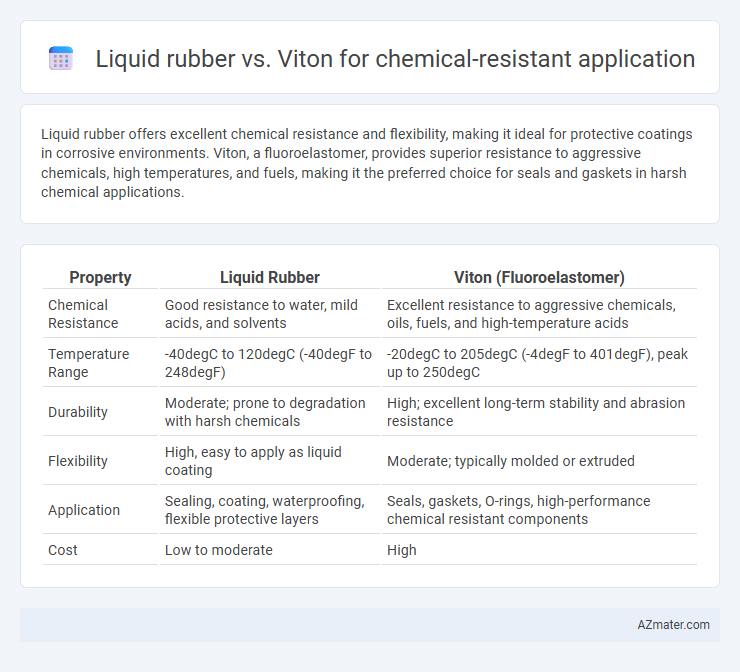Liquid rubber offers excellent chemical resistance and flexibility, making it ideal for protective coatings in corrosive environments. Viton, a fluoroelastomer, provides superior resistance to aggressive chemicals, high temperatures, and fuels, making it the preferred choice for seals and gaskets in harsh chemical applications.
Table of Comparison
| Property | Liquid Rubber | Viton (Fluoroelastomer) |
|---|---|---|
| Chemical Resistance | Good resistance to water, mild acids, and solvents | Excellent resistance to aggressive chemicals, oils, fuels, and high-temperature acids |
| Temperature Range | -40degC to 120degC (-40degF to 248degF) | -20degC to 205degC (-4degF to 401degF), peak up to 250degC |
| Durability | Moderate; prone to degradation with harsh chemicals | High; excellent long-term stability and abrasion resistance |
| Flexibility | High, easy to apply as liquid coating | Moderate; typically molded or extruded |
| Application | Sealing, coating, waterproofing, flexible protective layers | Seals, gaskets, O-rings, high-performance chemical resistant components |
| Cost | Low to moderate | High |
Introduction to Chemical Resistant Materials
Liquid rubber and Viton are prominent chemical-resistant materials widely used in industrial sealing and coating applications. Liquid rubber offers flexibility, ease of application, and resistance to a broad spectrum of chemicals, including acids, solvents, and oils, making it ideal for protective coatings and linings. Viton, a fluoropolymer-based elastomer, provides exceptional resistance to high temperatures, aggressive chemicals, fuels, and hydraulic fluids, making it suitable for demanding environments requiring durable seals and gaskets.
Overview of Liquid Rubber
Liquid rubber offers a flexible, cost-effective coating solution with excellent chemical resistance, particularly against acids, alkalis, and solvents. Its seamless application forms a durable barrier that adapts well to irregular surfaces, making it ideal for protecting equipment in harsh chemical environments. Compared to Viton, liquid rubber provides more versatility in application methods but typically has lower temperature resistance and shorter durability in extreme conditions.
Overview of Viton
Viton, a brand of fluoroelastomer, exhibits exceptional chemical resistance, particularly against hydrocarbons, acids, and high temperatures, making it ideal for demanding industrial applications. Its molecular structure provides superior impermeability to gases and solvents compared to liquid rubber, enabling longer service life in harsh environments. Viton's resistance to degradation from fuels, oils, and aggressive chemicals outperforms many standard elastomers used in sealing and gasketing solutions.
Chemical Resistance Properties: Liquid Rubber vs Viton
Liquid rubber offers excellent chemical resistance against water, acids, alkalis, and some solvents, making it suitable for applications requiring flexible and durable barriers. Viton, a fluoroelastomer, provides superior resistance to aggressive chemicals, fuels, oils, and high temperatures, outperforming liquid rubber in harsh environments. For chemical-resistant applications involving strong solvents and elevated conditions, Viton's molecular structure ensures enhanced durability and long-term stability compared to liquid rubber.
Application Environments and Industry Usage
Liquid rubber offers excellent chemical resistance in environments with exposure to acids, alkalis, and solvents commonly found in wastewater treatment and food processing industries. Viton excels in high-temperature and aggressive chemical applications such as automotive fuel systems, aerospace seals, and industrial gaskets where resistance to hydrocarbons, oils, and fuels is critical. Both materials are extensively used in chemical manufacturing plants and pharmaceutical industries, with Liquid rubber favored for flexible coatings and Viton preferred for durable sealing solutions.
Durability and Longevity Comparison
Liquid rubber offers excellent chemical resistance with flexibility and self-healing properties, making it ideal for dynamic environments. Viton withstands higher temperatures and aggressive chemicals longer, providing superior durability and longevity in harsh industrial conditions. Choosing between them depends on specific exposure scenarios, balancing flexibility needs with maximum chemical and thermal resistance.
Temperature and Weather Resistance
Liquid rubber offers excellent flexibility and weather resistance, maintaining performance in temperatures ranging from -40degC to 120degC, making it suitable for outdoor applications exposed to UV radiation and moisture. Viton, a fluoropolymer elastomer, provides superior chemical resistance and can withstand extreme temperatures from -26degC up to 204degC, excelling in both high-heat environments and harsh chemical exposure. For applications requiring prolonged durability under severe temperature fluctuations and intense weather conditions, Viton generally outperforms liquid rubber, though liquid rubber remains a cost-effective choice for moderate temperature and weather-resistant needs.
Cost and Availability
Liquid rubber typically offers a lower cost and greater availability compared to Viton, making it an economical choice for chemical-resistant applications. Viton, a fluoroelastomer known for superior chemical resistance and high-temperature stability, commands a higher price and may have limited availability due to specialized manufacturing. Businesses prioritizing budget and easy procurement often select liquid rubber, whereas Viton is preferred for demanding environments despite increased cost and supply constraints.
Installation and Maintenance Considerations
Liquid rubber offers flexible application with easy brush or spray installation, making it ideal for irregular surfaces and reducing labor time in chemical-resistant coatings. Viton, a fluoropolymer elastomer, requires precision molding or extrusion, often necessitating professional installation but delivers superior resistance to aggressive chemicals and high temperatures. Maintenance of liquid rubber coatings involves periodic inspections and touch-ups due to potential wear, whereas Viton seals demand minimal upkeep with longevity under harsh chemical exposure.
Choosing the Right Material for Chemical Resistance
Liquid rubber offers excellent flexibility and cost-effective sealing solutions for chemical-resistant applications, especially in environments involving acids, alkalis, and solvents. Viton, a fluoroelastomer, provides superior chemical resistance against a broader range of aggressive chemicals, including fuels, oils, and high-temperature fluids, making it ideal for demanding industrial conditions. Selecting the right material depends on the specific chemical exposure, temperature range, and mechanical stress, with Viton preferred for harsh environments and liquid rubber suitable for less severe or flexible sealing needs.

Infographic: Liquid rubber vs Viton for Chemical resistant application
 azmater.com
azmater.com